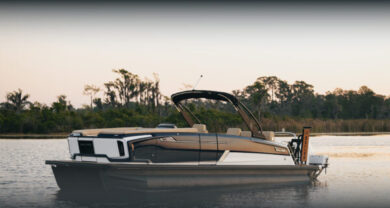Mercury’s St. Cloud facility earns zero-waste designation

Mercury Marine, a division of Brunswick Corporation (NYSE: BC), today announced that its Plant 7 manufacturing operation in St. Cloud, Florida, has achieved a zero-waste-to-landfill designation. The factory makes electrical and plastic components for the company’s marine engines and related parts, accessories and technologies.
Plant 7 is the fourth Mercury facility to achieve this designation. Its three predecessors are all distribution centers: one at the Mercury world headquarters in Fond du Lac, Wisconsin; another in Old Lyme, Connecticut, as part of the Land ‘N’ Sea subsidiary’s operations; and another at the Mercury European headquarters in Petit-Rechain, Belgium.
The St. Cloud operation has the distinction of being the company’s first manufacturing plant to earn the zero-waste-to-landfill label and the first facility to employ waste-to-energy methodology to help achieve this sustainability benchmark.
“As part of our sustainability goals, Mercury is taking decisive measures to reduce our climate impact, including reducing our dependence on landfill disposition of our waste across the enterprise,” said Scott Louks, Mercury sustainability manager. “In all cases, this was no simple accomplishment. The distribution centers extensively deal with packing materials and containers that — without focused efforts to reduce, reuse and recycle — could generate considerable landfill waste. And avoiding the use of landfills when manufacturing electrical and plastic components likewise requires careful analysis and creative waste-stream solutions to minimize the impact on the environment.”
According to Bob Rock, materials manager at the St. Cloud facility, one of these creative solutions involves converting waste into a source of energy.
“Plant 7 recently launched a program to divert 250 tons annually of manufacturing waste — including paper, wood, plastics, cardboard and packaging materials — away from landfills to a company that manufactures a product it calls Enviro-Fuelcubes. Designated by the EPA as non-waste fuel, the cubes are an engineered alternative fuel designed to be a cost-effective and cleaner pound-for-pound replacement for coal and other traditional fossil fuels. Plant 7 waste materials will now go toward creating clean fuel for energy-intensive industrial processes such as the manufacture of cement and lime, as well as creating power for public consumption,” Rock said.
“After working for many years to put a lasting recycling program in place for waste generated by our injection-molding process, we have finally accomplished an even better solution. I’m proud to have led a team effort to develop a process that avoids contributions to air, soil and water pollutants resulting from landfill disposals,” he added.
For ongoing compliance with the required standards, Mercury has empowered teams at each of its zero-waste-to-landfill locations to develop sound methodology for ongoing monitoring. The teams regularly measure their respective plants’ waste-stream materials generated from operations and the amount of those materials moved into the proper processes of reuse and recycling.




